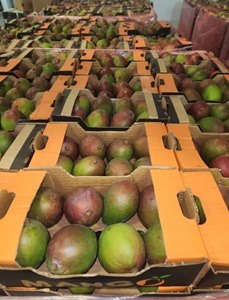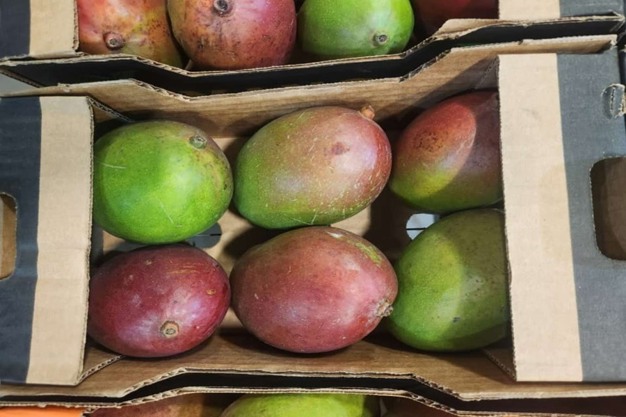
A South African mango farmer is furious at unripe Tommy Atkins mangoes sold last week at the Joburg Market as class 1 fruit, after being rejected on grounds of immaturity on the first of November.
Right: the mangoes in question
There were no significant other mango volumes on the market when this consignment (allegedly from Komatipoort) arrived. The only mangoes in the region at this time of the year come from Mozambique. The mango harvest in South Africa, around Malelane, Mpumalanga, only starts in at least a week's time.
"It is extremely bad for our industry because we know it's impossible to already be harvesting mangoes in the last week of October. It does a lot of damage to the industry," says Jaco Fivaz of Mohlatsi Farm, Hoedspruit. He was recently re-elected as chairperson of the South African Mango Growers Association. "We are furious that the fruit was rejected and that the agent nevertheless went ahead with selling them. It's the fourth or fifth year that immature mangoes end up on the market."
Fivaz claims that the immature mangoes were probably ripened with ethylene before being sent to the market, but its immaturity was detected by Prokon, an independent quality controller mandated by the Department of Agriculture to assess the quality of fresh produce delivered to the municipal markets.
A Prokon inspector put the fruit on hold on Friday 1 November, based on its immaturity as gauged against a colour chart and according to a pressure test. "The values ranged between 0.0 and 0.15 where they should at least meet the minimum requirement of 0.3 on the colour chart," Fivaz says. A market agent may not refuse a Prokon finding and the fruit should have been taken off the sales system, he adds.
Fivaz maintains that the mangoes that receive ethylene treatment will never fully externally colour up, nor develop adequate sugars, and its shelf life will necessarily be shortened. Such fruit will inevitably be a huge disappointment to the buyer, he says. A mango picked too early will never ripen.
Second Prokon inspection cleared the mangoes for sale
On Wednesday 6 November, the inspector retested the retention sample, found that the brix and colour had improved to a minimum level of ripeness, and sales were allowed to resume.
When Jaco Fivaz learned that the mangoes were back for sale at the Joburg Market, he was outraged. The fruit was sold as class 1 fruit for around R70 per 2kg carton.
"This is a disaster," he says. "As a farmer I am very dissatisfied that Prokon couldn't stop these mangoes from being sold and that five days later, they were approved."
 Immature, hyper-early fruit sold as class 1 fruit to the detriment of the whole industry, says Jaco Fivaz of Mohlatsi Farm
Immature, hyper-early fruit sold as class 1 fruit to the detriment of the whole industry, says Jaco Fivaz of Mohlatsi Farm
It is possible that the farmer originally sold the immature fruit under the impression that it was meant for processing – South Africans love a condiment, achar, made with unripe mangoes. The mangoes were sent to Joburg Market by a seller (whose name is known to FreshPlaza) registered in KwaZulu-Natal as class 1 mangoes in the cartons usually employed for table mangoes. Unripe mangoes for processing are sold in bags.
Fivaz says he knows where the fruit came from. "I've been fighting against this for four years: every year it's the same agent and the same suppliers. It does tremendous damage to the mango industry and it's unbelievably selfish that guys operate in this way just to make a quick buck."
Joachim Prinsloo of Sunreaped agrees. Sunreaped grows very early mangoes in Mozambique, to fill the gap before the start of the South African season. "We are tremendously strict about testing our fruit's ripeness levels because we feel a great sense of responsibility when it comes to the very early mango season. Hearing of unripe fruit being sold at the market just really annoys me."
Responsible mango farmers are still letting their mangoes hang, Fivaz notes, and they resist the temptation of rushing to be the first on the market. Mohlatsi Farm is considering a formal complaint against the market agent involved in the transaction.
"Responsible farmers," he urges, "should pull together against market agents who don't heed Prokon decisions."
For more information:
Jaco Fivaz
Mohlatsi Farm
Email: [email protected]
